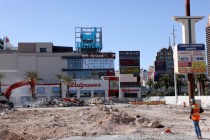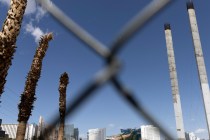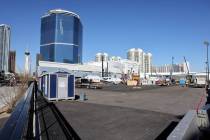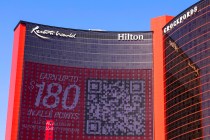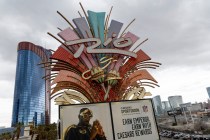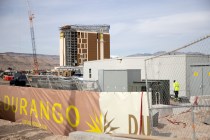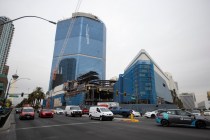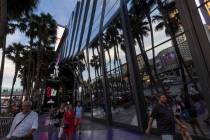Las Vegas housing recovery continues; hotel sale may be imminent
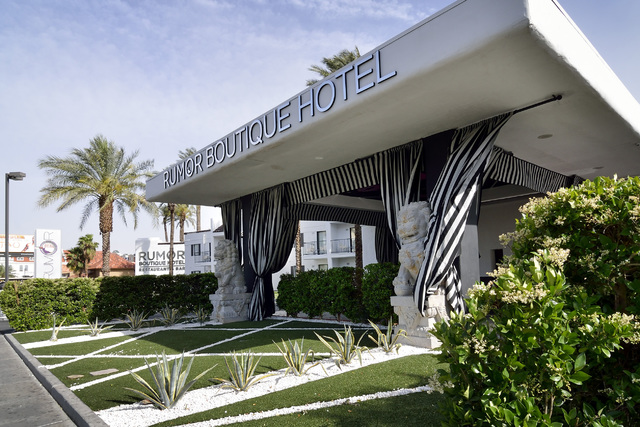
It wasn’t long ago – less than a decade – that Las Vegas’ housing market was a mass grave of foreclosures.
Lenders seized tens of thousands of homes per year after the real estate bubble burst and the valley’s once-roaring economy imploded. Sales of bank-owned houses dominated the resale market, and with thousands of vacant properties for the taking, a black market of squatters – bogus leases in hand – eventually took shape, spreading around town even as the overall economy was on the mend.
Southern Nevada still gets more repo activity than most areas of the country. But overall, its foreclosure woes aren’t nearly as severe as they used to be.
Lenders repossessed about 4,000 homes in the Las Vegas area last year. That’s down from 11,900 repos in 2012 and more than 30,000 annually between 2008 and 2011, with a peak of just over 35,000 in 2009, according to national housing tracker Attom Data Solutions.
Overall, 1.2 percent of homes locally were hit with a foreclosure-related filing last year, down from 12 percent in 2009.
Despite the improvement, Las Vegas had the 15th highest foreclosure rate last year among 200-plus metro areas with at least 200,000 people, Attom reported this week.
It’s a familiar scenario in Las Vegas: better than it used to be, but still lagging other cities.
The local unemployment rate, for instance, was 5.1 percent in November, far below a peak of 14 percent in 2010. But it’s still tied for fourth-highest among large metro areas, according to federal data. Also, almost 17 percent of local homeowners with mortgages were underwater in the third quarter, down from a peak of 71 percent in early 2012 but still second-highest among large metros, says home-listing service Zillow.
Las Vegas’ foreclosure totals are sliding amid a nationwide recovery. The U.S. foreclosure rate last year was the lowest since 2006, or during the housing boom, Attom reported.
But in some cities, repos have ramped up.
Atlantic City, hit with a rash of casino closures the past few years, carried the highest foreclosure rate in the country last year: around 4,300 homes, or 3.4 percent of properties, were hit with foreclosure-related papers in 2016.
That’s up from about 830 homes, or 0.65 percent of properties, in 2011, according to Attom.
Here are a couple of possible sales to keep your eye on:
■ Rumor, a boutique hotel across the street from the Hard Rock casino-resort, is listed for $18 million with brokerage Sun Commercial Real Estate, and a deal is “pending,” according to the firm’s website.
The 150-room property, east of the Strip at 455 E. Harmon Ave., is owned by The Siegel Group, operators of the Siegel Suites chain of low-priced apartment buildings.
One source tells me the deal is slated to close by the end of January and that Rumor would trade for right around $18 million. No word yet on the buyer’s identity.
Listing broker Josh Smith of Sun Commercial declined comment, as did Michael Crandall, senior vice president with The Siegel Group.
■ Owners of the Pioneer hotel-casino in Laughlin, 100 miles southeast of Las Vegas, reached a deal in August to sell the property for $11 million, according to a financial document obtained by the Review-Journal. The deal covers the Pioneer’s real estate “and substantially all of its personal property,” it says.
Pioneer’s owner, Archon Corp., would lease back the property, says the document, which names the buyer as King David LLC.
The document does not say when the sale was scheduled to close. But it says the buyer paid a $100,000 deposit and that there “can be no assurances” that the transaction would be completed.
Archon is controlled by the Lowden family of Las Vegas, whose other holdings include the former Wet ‘n Wild waterpark site on the north Strip, a now-vacant lot between the SLS Las Vegas and the mothballed Fontainebleau tower.
King David is controlled by Ray Koroghli of Henderson, state records show. Neither he nor Archon management could be reached for comment this week.
The sales price, meanwhile, would be a fraction of what Archon paid last decade: The company announced in early 2004 that it bought the property for about $36 million as part of an option under its existing lease.
Contact Eli Segall at 702-383-0342 or esegall@reviewjournal.com. Follow @eli_segall on Twitter.




